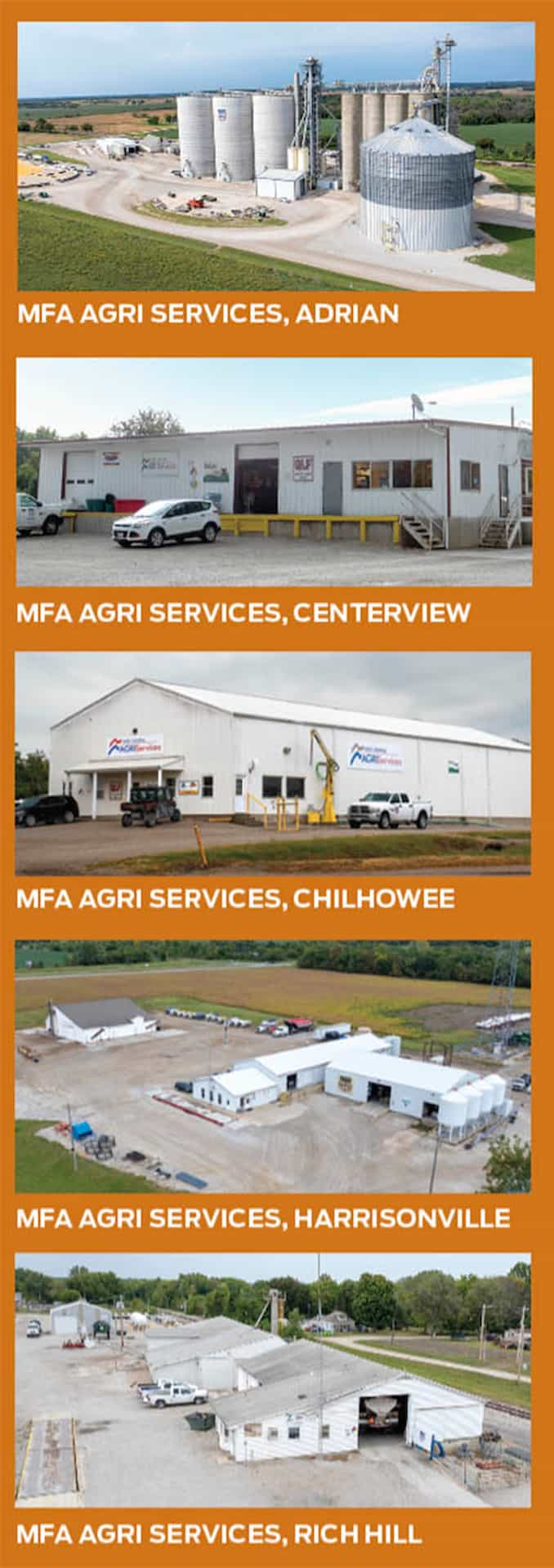Co-op comeback
By Allison Jenkins
West Central AGRIServices locations return to cooperative structure, passing benefits to the next generation
For the first time in more than two decades, farmers who do business with MFA’s West Central AGRIServices (WCAS) can be cooperative members—reconnecting with a tradition of shared ownership and benefits.
 As of Sept. 1, all five WCAS locations—Adrian, Centerview, Chilhowee, Harrisonville and Rich Hill—officially became part of MFA Incorporated’s cooperative business. The move comes as part of the company’s ongoing efforts to align operations for the future, said Jason Weirich, MFA executive vice president of operations.
As of Sept. 1, all five WCAS locations—Adrian, Centerview, Chilhowee, Harrisonville and Rich Hill—officially became part of MFA Incorporated’s cooperative business. The move comes as part of the company’s ongoing efforts to align operations for the future, said Jason Weirich, MFA executive vice president of operations.
“The change reflects our commitment to the cooperative model and ensuring that MFA’s resources are positioned to deliver the greatest impact for our farmers,” Weirich said. “We look forward to serving customers of West Central as member-owners.”
WCAS was formed in 1999 as a strategic alliance with Central Cooperative and became a wholly owned subsidiary of MFA Incorporated in 2004. Throughout that time, WCAS served farmers across Cass, Bates, Henry and Johnson counties, building a reputation for trusted service. But because WCAS operated as a non-cooperative business, patrons were customers, not owners.
This transition changes that. Bringing WCAS locations into MFA’s cooperative structure means that farmers who conduct at least $5,000 of business annually will now earn membership in MFA, unlocking benefits such as patronage opportunities, voting rights and eligibility for tax advantages available only through cooperatives.
“As members, our customers can now have a voice in how things are done,” said Mike Simon, a 35-year MFA employee who manages West Central’s Harrisonville facility. “This location has a rich history of people being involved in the cooperative governance, but that was a generation ago. Personally, I’m glad to be back in the fold.”
For Carl Ferguson, who raises row crops near Adrian, Mo., the shift brings his family’s relationship with the co-op full circle. His father, Freeman, was an original member of Central Cooperative, which was formed in the mid-1970s by area farmers.
“Our local elevator in town had closed, and that limited access to elevators, which, at harvest time, really congested things. We needed something of our own,” Ferguson said. “Everybody pitched in some money to get it started. I was a high school graduate in 1974, and my dad encouraged me to throw in $1,000 for the cooperative. It took off and has been strong ever since.”
Now, as his sons, Alan and Brad, work toward taking over the family operation, they will finally have the chance to be co-op members again.
“My dad was there at the beginning, and I’ve been with it through all the changes,” Ferguson said. “My boys will have to make their own way, but I’m glad they can now be co-op members, too.”
 The advantages of membership go beyond ownership pride. Grain customers, for example, may be eligible for the Qualified Business Income (QBI) deduction under Section 199A of the U.S. Code—a tax benefit unique to cooperatives that can pass along significant savings to patrons based on grain delivered.
The advantages of membership go beyond ownership pride. Grain customers, for example, may be eligible for the Qualified Business Income (QBI) deduction under Section 199A of the U.S. Code—a tax benefit unique to cooperatives that can pass along significant savings to patrons based on grain delivered.
This provision is a modified version of what is still often referred to as the Domestic Production Activities Deduction (DPAD) and was made permanent by the “One Big Beautiful Bill Act” signed into law in July. Cooperatives calculate a per-bushel deduction and issue notices that can be used by grain customers to reduce taxable income when filing.
The deduction reflects grain sold in the prior calendar year. That means any potential tax benefits for West Central customers will not be available until 2026 because the cooperative transition happened at the end of MFA Incorporated’s 2025 fiscal year.
“Obviously, we’ve been a big grain facility for quite some time, and those cooperative tax benefits were always something we wished we could offer our customers,” said Dale Guss, Agri Services manager for the West Central Group. He joined WCAS in 1991 and worked in several of its locations before managing the Adrian facility. “While not guaranteed every year, it’s a great opportunity for our cooperative members who sell grain through MFA. The deduction can add up to some pretty big dollars.”
With West Central locations now part of MFA’s broader Agri Services network, farmers in the region can expect continuity where it matters—quality products, local service and the same dedicated employees they’ve come to know—combined with the added strength of MFA’s cooperative system.
“MFA has been super to work with over the years, and I’m happy to see us revert back to a cooperative,” Ferguson said. “Our local MFA always been a place we could depend on, and that’s the No. 1 thing for farmers—relationships, communication and people you can trust.”
Image caption: Lifelong farmer Carl Ferguson, who raises row crops just a few miles from MFA Agri Services in Adrian, Mo., was one of the original members of Central Cooperative that later became West Central AGRIServices in a strategic alliance with MFA Incorporated. As of Sept. 1, the West Central Group’s five locations are now part MFA’s cooperative business, restoring member-owner status to Ferguson and other area farmers.
View more articles from this October/November 2025 Today's Farmer magazine.